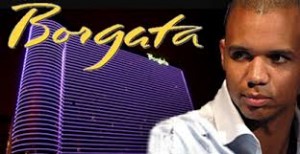
Borgata Volleys Back at Phil Ivey in Edge Sorting Case

The gloves are off: the Borgata gets tough as it steps up the legal fight to reclaim $9.8 million from poker legend Phil Ivey. (Image: calvinayre.com)
Attorneys for the Borgata Hotel and Casino have responded to Phil Ivey’s recent motion to dismiss the multimillion-dollar cheating case against him. Three weeks ago, the poker player’s lawyers requested that the case be dropped, claiming, among other things, that a six-month statute of limitations to recoup money lost in an “illegal” game had expired.
The case relates to four sessions of baccarat that Ivey and his associate and fellow defendant Cheng Yin Sun played at the Borgata in 2012, during which they won $9.6 million. The Borgata claims that Ivey and Sun were edge-sorting, i.e., using a system in which the player is able to determine the value of a card by observing subtle flaws in the pattern on the back, and is thus able to turn the odds to the player’s favor.
This, claims the casino, is fraud under New Jersey law and carries a prison sentence of “more than one year,” and possibly, considering the amount of money involved, five to ten years.
Representing the Borgata, attorney Jeremy Klausner rejected claims that the statute of limitations had expired, as well as the assertion of Ivey’s attorneys that supposed violations of state casino regulations cannot be pursued by individual casinos.
Nothing More Than the Use of Five Senses
“There simply is no private cause of action by player or casino to revoke and require restitution of gambling winnings or losses because of some perceived ‘illegality’ which springs from nothing more than a player’s subjective intent or use of his five senses,” Ivey’s attorney Louis Barbone asserted in the motion to dismiss.
Arguing against this point, Borgata’s counsel Klausner wrote: “Although the motion cleverly attempts to apply existing case law to the facts in this case, Defendants’ cannot escape the fact that it is only casinos, and not casino patrons, that are regulated by New Jersey’s Casino Control Act. While certain claims by patrons against casinos may be preempted by the Casino Control Act, there is no preemption in reverse. New Jersey’s Division of Gaming Enforcement simply does not have the power to order casino patrons to take any act, including making restitution to casinos for fraud, cheating, or breach of contract. Indeed, the only way for Borgata to seek redress against Ivey and Sun is through legal action.”
Legal Complexity
Klausner also cited a case last month in which the Golden Nugget was able to reclaim money won by a group of gamblers at the baccarat tables as a precedent for a casino receiving restitution in the aftermath of a “fraudulent game.” In that instance, gamblers realized that a deck was unshuffled and that the cards were being dealt sequentially, which meant they knew with certainty which cards were coming next.
The legal nuances of the Ivey/ Borgata case are complex and myriad and the outcome, if it goes to trial, may create a precedent that has interesting repercussions for the casino industry. Whether the Borgata will be able to prove fraud, or the court will agree with Ivey that it was all “pure skill,” remains to be seen. Until then, it’s clear that the Borgata means business; not content with simply reclaiming its losses, it is intent on criminal prosecution.
“Borgata specifically alleges acts involving gambling that are chargeable under state law and carry a prison sentence of more than one year,” it said.















0 Comments